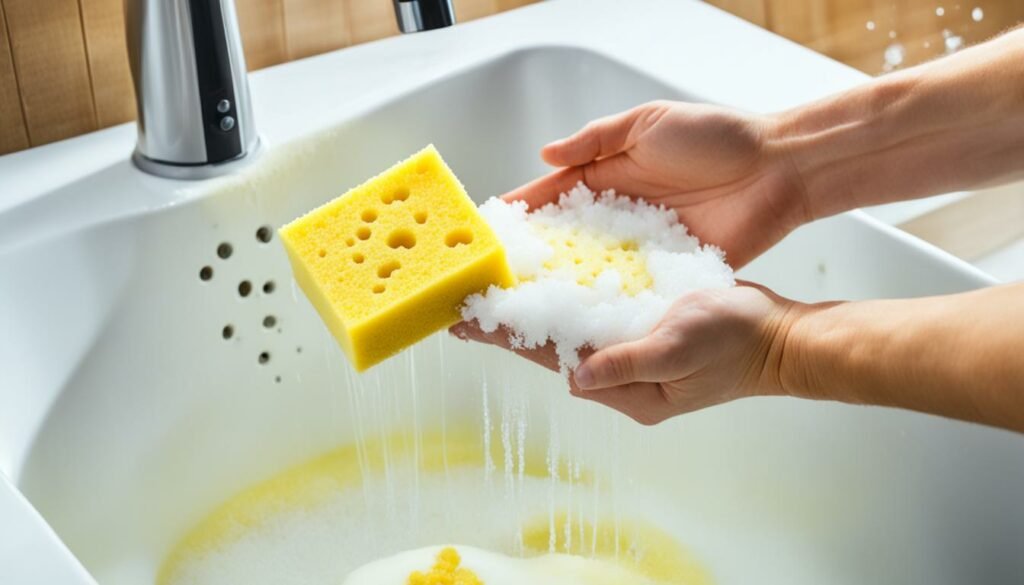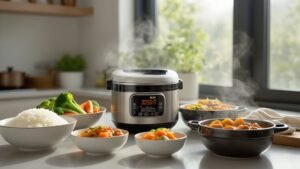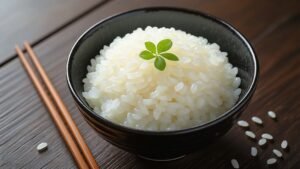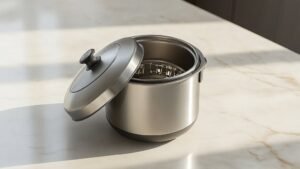Neglecting to keep your rice cooker clean can cause problems. These can range from poorer performance to health risks. Yes, not cleaning your rice cooker can lead to bacteria buildup. Let’s go through an easy process to clean your rice cooker. This will keep it running well for a long time.
Our guide is designed to make maintenance simple for you. Even if you’ve never cleaned a rice cooker before. You’ll learn what to do, making sure your rice always comes out perfectly.
Table of Contents
ToggleThe Importance of Regular Rice Cooker Maintenance
Maintaining your rice cooker is key to making it last. To keep it working well for a long time, just do a few easy things. These include cleaning to prevent food from sticking, protecting the non-stick surface, and stopping bad smells.
Preventing Buildup and Bacteria
Cleaning after each use stops food from building up. This stops bacteria and keeps everything clean. Wipe the outside and rinse the pot after you cook. Once a month, do a deep cleaning to clear away any tough gunk. A clean rice cooker isn’t just healthier, it makes better-tasting rice, too.
Protecting the Non-Stick Coating
The inside of your rice cooker is coated to stop food from sticking. This coating is sensitive, so treat it gently. Use soft cleaners and avoid metal tools. By doing this, the coating stays strong, making your cooking and cleaning easy.
Avoiding Unpleasant Odors
Old food left in the cooker can cause it to smell bad. Keep your cooker fresh by cleaning off any old food. Make sure the steam vent is clear to let out bad smells. This way, you always get rice that smells and tastes great.
Need more tips on how to keep your rice cooker clean? Check out this helpful guide for in-depth advice.
Initial Steps for Descaling Your Rice Cooker
Starting the descaling process right is key for your rice cooker. First, make sure you’re safe and know how to take it apart. We’ll show you how to do this right.
Ensuring Safety Before You Begin
Putting safety first is crucial before descaling your rice cooker. Each cooker might need a different cleaning approach. Always check your manual for special safety tips. But, here are some basic rules to follow:
- First off, unplug your cooker and wait for it to cool down.
- Be gentle with it to avoid damage.
- Don’t dunk it in water, as that’s bad for its electric parts.
- Use soft utensils to not harm the cooker’s surface.
- And, always keep it on a steady surface.
The Right Way to Disassemble
Opening up your rice cooker is the next step to descale it well. Here’s how you can safely take it apart:
- Make sure it’s unplugged and not hot.
- Take out the inner cooking pot.
- If the lid comes off, take it off gently.
- Look for more parts that can be removed and do so carefully.
Every rice cooker might need a unique way to take it apart. Check the manual for instructions. Getting the first steps right is important for a deep clean. It keeps your cooker working well for longer.
Choosing the Best Descaling Solution for Your Rice Cooker
When you’re descaling your rice cooker, picking the right solution is key. There are many options out there, making the choice hard. We’re here to guide you and help you find the best descaling solution for your rice cooker.
To pick the perfect descaling solution, think about a few things:
- Type of Rice Cooker: Different rice cookers might need specific descaling solutions. Always check the manual for their recommendations. This ensures you use the right type of solution.
- Mild yet Effective: Find a solution that’s gentle but gets the job done. It should be strong enough to clear mineral buildup. Steer clear of harsh chemicals that can harm your cooker or affect the flavor of your rice.
- Compatibility with Non-Stick Coating: For cookers with non-stick coatings, make sure the solution won’t damage it. Using a harsh solution might scratch or harm the coating, making it less effective. This also shortens its life.
- Ease of Use: Look for a solution that’s easy to handle. Ease of preparation and usage is important. Some are ready to use, while others need to be mixed. Choose what fits your routine best.
Choosing the best descaling solution for your rice cooker means you can clear away harmful mineral deposits. This helps your cooker work well and last longer. Later on, we’ll suggest natural ingredients as eco-friendly scaling solution alternatives.
Descaling Your Rice Cooker with Natural Ingredients
If you’re looking for safe ways to clean your rice cooker, we’ve got some tips. We know how important eco-friendly cleaning is. And we want to help you with easy-to-find ingredients like vinegar and lemon juice.
Vinegar is great for getting rid of build-up in your rice cooker. It’s acidic, making it a top choice for a natural clean. Here’s how to descale with vinegar:
- Fill your rice cooker with equal parts vinegar and water.
- Run a complete cooking cycle.
- Let the mix sit in the pot for 15-20 minutes.
- Rinse the pot with water well.
This method cleans away limescale and old residue. Your cooker will be clean and ready to go.
Another good mix is baking soda and lemon juice. This combo works well for deep stains and smells bad odors. Here’s what you do:
- Sprinkle baking soda on the pot’s bottom.
- Add lemon juice to it.
- Use a sponge to spread the mix all over.
- Let it sit for 1-2 hours.
- Scrub gently with a soft brush.
- Rinse the pot well.
These methods keep your rice cooker in good shape for longer. With vinegar and these natural ingredients, cooking stays clean and fresh.
For more rice cooker tips, take a look at Aroma’s guide.
Advanced Tips for Rice Cooker Lime Scale Removal
In this part, we’ll share expert tips to remove lime scale from your rice cooker. Lime scale can harm the cooker and shorten its life. We’ll look at using vinegar or a mix of lemon juice and baking soda to fight lime scale.
The Vinegar Descaling Method
Vinegar is known to be very good at taking off lime scale. It’s a natural cleaning agent that’s cheap and can remove mineral buildup. Here are the steps to clean your rice cooker with vinegar:
- First, make sure your cooker is off and has cooled down.
- Then, mix white vinegar and water in the pot. Use the same amount of each.
- Let the mixture sit in the pot for 30 minutes. For very tough build-up, you can leave it longer.
- Next, turn on the cooker to cook like you normally would.
- After it’s done, pour out the vinegar mix and wash the pot well with water.
- Finally, dry it thoroughly before your next use.
Lemon Juice and Baking Soda for Stubborn Residue
If vinegar can’t remove the build-up completely, try lemon juice and baking soda. Mixing them makes a paste that can ease off stubborn stains. This is how to use them:
- Mix lemon juice and baking soda to make a paste.
- Apply the paste on the stains, covering them well.
- Let it sit for 15 minutes.
- Then, gently scrub the build-up with a soft sponge.
- Rinse the pot well. Make sure all residue and baking soda is gone.
- Thoroughly dry the pot before using again.
These tips will keep your rice cooker in top shape. Regular cleaning and descaling are important. They’ll help your rice cooker last longer and cook your rice perfectly every time.
Easy Rice Cooker Cleaning for Daily Upkeep
Keeping your rice cooker clean is important for it to last longer and work better. A simple cleaning routine after each use can do wonders. Plus, remember to clean the accessories well to maintain the cooker’s condition.
Post-Cooking Cleaning Routine
After your delicious meal, a thorough clean is key to avoid residue and bacteria. Follow these steps to clean it daily:
- Unplug your rice cooker and let it cool.
- Take out the inner pot and accessories like the steam basket and paddle.
- Clean out any leftover food or liquid from the pot.
- Rinse the pot and accessories with warm water to get rid of any loose bits.
- Gently scrub them with mild soap using a soft sponge or cloth.
- Thoroughly rinse everything with warm water to clear any soap.
- Wipe the outside of the cooker with a damp cloth.
- Dry all parts with a soft towel before putting everything back.
- Reassemble the cooker once everything is dry and store it in a clean place.
For more specific tips on cleaning, check out this guide from The Spruce.
Deep Cleaning Accessories like Steam Baskets and Paddles
It’s also crucial to deep clean accessories like the steam basket and paddles. Here’s how to do it:
- Soak the accessories in warm, soapy water.
- Let them soak for about 20 minutes to soften any hard-to-remove residue.
- Use a soft sponge to clean the accessories thoroughly.
- Rinse them well to remove all soap.
- Dry completely with a soft cloth or towel.
Regular cleaning prevents bad smells, crusty rice grains, and harmful bacteria, making your cooker safe for cooking. Always avoid harsh cleaning tools to protect your cooker’s surface.

Conclusion
Regular cleaning and descaling are crucial for your rice cooker to work well and last long. Follow the easy guide and tips from this article. This way, your rice cooker will stay in great shape for many years.
By taking care of your rice cooker, you will get perfect rice meals every time. Enjoy the tasty and well-cooked rice thanks to your efforts.
FAQ
Why is regular maintenance of my rice cooker important?
Keeping your rice cooker clean helps prevent food and bacteria buildup. It also preserves its non-stick surface. This avoids bad smells too.
What are the initial steps for descaling my rice cooker?
First, make sure you’re safe. Then take your rice cooker apart to reach all the parts you need to clean.
How do I choose the best descaling solution for my rice cooker?
We’ll help you pick the best descaling solution. It depends on your rice cooker type and what you like.
Can I descale my rice cooker using natural ingredients?
Yes, you can! We’ll show you how to use vinegar and lemon juice. These are natural and good for the environment.
What are the advanced tips for rice cooker lime scale removal?
Find out how vinegar can efficiently clean your rice cooker. We’ll also share tips on using lemon juice and baking soda for tough stains.
How do I clean my rice cooker for daily upkeep?
Learn an easy way to clean your rice cooker after every use. We’ll also tell you how to wash steam baskets and paddles really well.






